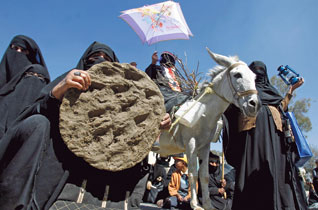
Sana'a: The Yemen cabinet's approval of the controversial draft law granting outgoing President Ali Abdullah Saleh immunity from prosecution has sparked a heated debate. While pro-democracy protesters have rejected the law outright, others view the amnesty law as the only option to break the political deadlock in the country.
Last Sunday, Yemen's new cabinet passed a law which offers Saleh and anyone who worked with him during his 33-year rule in the civil service, security and military, immunity from prosecution for crimes committed. The law must also be given Parliament's seal of approval before it takes effect.
Saeed Thabet Saeed, a Yemeni political analyst, told Gulf News that the amnesty law remains ambiguous and subject to interpretations since it does not identify the names and the number of persons who have worked with Saleh.
"The law is a confession that Saleh's regime has committed crimes and must be pardoned for their crimes. No one has the right to forgive people for crimes and it is against international law," Saeed said.
Facilitates Saleh's exit
However, Saeed is among many who believe that the law remains the only alternative left to save the country.
"The law serves as a temporary solution to the Yemen problem if it involves Saleh's exit from the political arena," he added. Following the implementation of the law, all politicians and military officials associated with Saleh will be asked to abstain from political participation. However, Saeed believes they will try to manoeuver their way back in.
"Saleh cannot play his usual trick because the law is sponsored by the international community. When Saleh said that he changed his mind about travelling to the United States, he tried to politically blackmail the Americans and wanted to say that he can stay put and shuffle the cards. I think he will travel to the US and get the amnesty."
Anti-Saleh protesters blame the President and his close aides of killing more than 1,000 people since the uprising began. They insist that the law lets Saleh's regime off the hook. Buthra Al Magtrai, an activist from Taez, said protesters neither accepted the amnesty law nor the GCC-sponsored transition deal. "We endeavour to hold the regime accountable for all their crimes. Many of them are still in power and could ally with the new regime under the deal. The GCC deal did not address Yemen's thorny issues, but delayed them instead," she said.
Show of ‘rejection'
"We are planning practical steps to show our rejection of the amnesty law. We will boycott the coming presidential election, arrange sit-ins and work on bringing the attention of the national and international media to Saleh's crimes. In the coming days, families of the victims of Saleh's crackdown will organise protests across the country."
"A post-Saleh country will be an inclusive and democratic one. The new government will be held accountable by the people," she said.
Meanwhile, the Joint Meeting Party (JMP), a coalition of former opposition members, nominated Vice-President Abd Rabbo Mansour Hadi as a consensus candidate for the presidential election.












